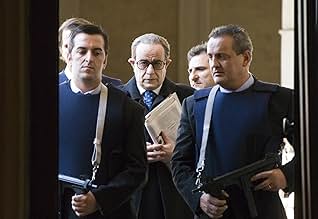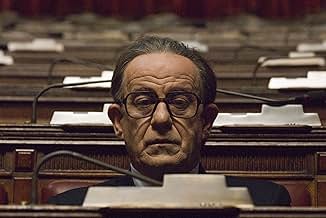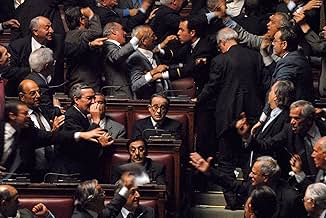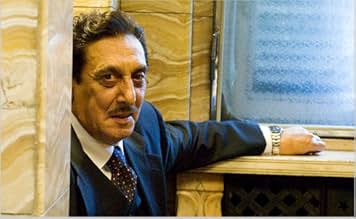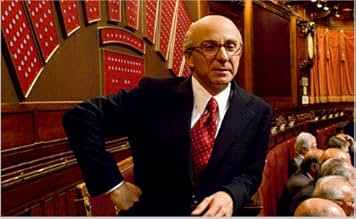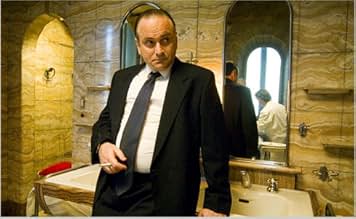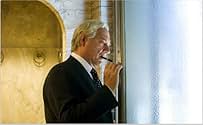AVALIAÇÃO DA IMDb
7,2/10
20 mil
SUA AVALIAÇÃO
A história do político italiano Giulio Andreotti, que foi sete vezes primeiro-ministro da Itália desde a restauração da democracia, em 1946.A história do político italiano Giulio Andreotti, que foi sete vezes primeiro-ministro da Itália desde a restauração da democracia, em 1946.A história do político italiano Giulio Andreotti, que foi sete vezes primeiro-ministro da Itália desde a restauração da democracia, em 1946.
- Indicado a 1 Oscar
- 32 vitórias e 40 indicações no total
Avaliações em destaque
A film to admire but impossible to love. Not an ounce of humanity to cling on to. Splendidly put together but only with the intellect so, for non Italians a puzzle that seems like a figment of someone's imagination and to be taken as a sort of intellectual metaphor. How can a creature from hell in good terms with the Catholic Church can survive all this years and when I say survive I mean survive from every possible angle. Italians know that is not only true but normal. I'm half Italian so I know what I'm talking about. Andreotti is played by Paolo Servillo in a performance that is part caricature, part faithful portrait, a work of genius and I suspect that the slightly surreal, grotesque undertones, allowed the movie to be made and succeed in the way it did, at least in Italy. I saw it in New York where I was the only spectator in the theater. I can't wait to see where director Sorrentino will take us next.
Giulio Andreotti is the seven times Prime Minister of Italy leading the ruling Christian Democracy Party. In 1978, The Red Brigades kidnaps his rival former Prime Minister Aldo Moro. Andreotti refuses to negotiate and Moro is killed. Over the next 15 years, various people are mysteriously killed. In 1991, he's named Senator for Life. In 1992, he resigns as Prime Minister. His bid for the Presidency fails and he goes on trial for corruption with the Mafia.
I have one problem with this movie and it's a big one. I feel like I did a PhD on Italian politics watching this movie. The first half is nearly impossible to follow for someone like me who knows nothing about Italy during this time. It's a lot of style but I couldn't understand the substance. There are a lot of deaths but I don't know the significance of some of them. The second half is more compelling with the criminal trial. It becomes a character study and Andreotti is an intriguing character. I'm sure this movie is much more compelling for people with a background in Italian politics during this time. A lot of this is going over my head.
I have one problem with this movie and it's a big one. I feel like I did a PhD on Italian politics watching this movie. The first half is nearly impossible to follow for someone like me who knows nothing about Italy during this time. It's a lot of style but I couldn't understand the substance. There are a lot of deaths but I don't know the significance of some of them. The second half is more compelling with the criminal trial. It becomes a character study and Andreotti is an intriguing character. I'm sure this movie is much more compelling for people with a background in Italian politics during this time. A lot of this is going over my head.
Giulio Andreotti can be seen as both the precursor to, and the antithesis of, Silvio Belusconi: an Italian politician with his fingers on every lever that led to power, accused of everything but convicted of nothing, and yet peculiarly devoid of conventional charisma. A sense of a particularity, of a man who had become nothing beyond a carefully constructed defence of his own behaviour, was nicely captured in Tim Parks' fictional work 'Destiny'; and we get the same feeling in 'Il Divo', a biopic with an extraordinary performance Toni Sevillo by in the lead role. What neither offer is definitive, or even speculative, resolution of the enigma and his actions; just a chilling yet plausible portrait of the man. Yet without providing clear answers, something else must provide the story. In Parks' book, Andreotti was a bit part; in the film, there's no other narrative, and sometimes the direction feels a little too heavy, overdone perhaps because there isn't a smooth tale holding things together. And the music on the soundtrack seems deliberately incongruous, thrown into the mix to provide some variation in tone that would otherwise have been lacking. But Servillo's performance more than compensates; it will lead you wanting the same answers, one suspects, that everyone has wanted from Andreotti for a long long time.
This movie puts on screen what all Italians know since decades: directly or indirectly Andreotti is behind all major events happened in Italy in the last 45 years. This is what we know, as we all knew that virtually all politicians at all level were (and are) robbing the public funds and make private deals with business men.
The movie shows exactly this: we know it but we do not have the evidences.
Sorrentino tries to bridge this gap by putting together a lot of informations that make a pretty clear scenario, but without evidences. The result is a portrait of a divinity: you know that is there, you know that everything happens because of his will, but on earth everything happens by chance so that the fact that Andreotti is the mastermind of everything becomes a matter of divine faith.
The strength of the movie rests on the capacity to describe a personality that is so powerful that does not need to speak, does not need to go on TV, he is able to make things happen in a way that only Andreotti knows. Andreotti is above the politics, above the Church, above finance, above mafia, he is depicted as a power that stands on its own, someone who uses all the different leverages to rule.
Andreotti got it away with his trials and only Andreotti knows how. For a man of his power, it was the least you could expect.
At the end, Italians have to acknowledge that in the 20th century Italy was ruled by the King (shortly), Mussolini and Andreotti. But if you remember the Glossary shown at the beginning of the movie, through the Loggia P2, Sorrentino suggests that Berlusconi could be the person in charge to continue the job. Whether this is the will of Andreotti or not is a matter of faith.
The movie shows exactly this: we know it but we do not have the evidences.
Sorrentino tries to bridge this gap by putting together a lot of informations that make a pretty clear scenario, but without evidences. The result is a portrait of a divinity: you know that is there, you know that everything happens because of his will, but on earth everything happens by chance so that the fact that Andreotti is the mastermind of everything becomes a matter of divine faith.
The strength of the movie rests on the capacity to describe a personality that is so powerful that does not need to speak, does not need to go on TV, he is able to make things happen in a way that only Andreotti knows. Andreotti is above the politics, above the Church, above finance, above mafia, he is depicted as a power that stands on its own, someone who uses all the different leverages to rule.
Andreotti got it away with his trials and only Andreotti knows how. For a man of his power, it was the least you could expect.
At the end, Italians have to acknowledge that in the 20th century Italy was ruled by the King (shortly), Mussolini and Andreotti. But if you remember the Glossary shown at the beginning of the movie, through the Loggia P2, Sorrentino suggests that Berlusconi could be the person in charge to continue the job. Whether this is the will of Andreotti or not is a matter of faith.
This is a film of two parts - something which a previous comment didn't really make clear - we see the events of Italy during Andreotti's reign in the first half from Andreoti's point of view: then in the second half we see the same events again from (depending on your perspective) either a more dispassionate or a more disparaging observation.
As a bit of cinema it is brilliant (one or two IMO rather silly unslick bits of special FX, just ignore them!) but altogether not to be missed. I doubt that it will translate well, and even for a seasoned appassionato of Italian politics the introduction of characters using (clever) superimposed text was flawed by the overshort screen time which these important notes were allowed.
As a bit of cinema it is brilliant (one or two IMO rather silly unslick bits of special FX, just ignore them!) but altogether not to be missed. I doubt that it will translate well, and even for a seasoned appassionato of Italian politics the introduction of characters using (clever) superimposed text was flawed by the overshort screen time which these important notes were allowed.
Você sabia?
- CuriosidadesThe first cut of the movie was 145-minute long.
- Citações
Giulio Andreotti: I know I am an average man but looking around I do not see any giant.
- Cenas durante ou pós-créditosEnd credits features the following dedication: "per Daniela, che mi ha salvato" ("for Daniela, who saved me"). Daniela D'Antonio is Paolo Sorrentino's wife.
- ConexõesFeatured in The 82nd Annual Academy Awards (2010)
- Trilhas sonorasLa prima cosa bella
Written by Mogol, Gian Piero Reverberi and Nicola Di Bari
Performed by Ricchi e Poveri
Published by Universal Music Publishing Ricordi S.r.l.
Courtesy of EMi Music Italy S.p.a.
Principais escolhas
Faça login para avaliar e ver a lista de recomendações personalizadas
- How long is Il Divo?Fornecido pela Alexa
Detalhes
Bilheteria
- Orçamento
- € 5.700.000 (estimativa)
- Faturamento bruto nos EUA e Canadá
- US$ 240.159
- Fim de semana de estreia nos EUA e Canadá
- US$ 13.867
- 26 de abr. de 2009
- Faturamento bruto mundial
- US$ 11.260.366
- Tempo de duração
- 1 h 50 min(110 min)
- Cor
- Mixagem de som
- Proporção
- 2.35 : 1
Contribua para esta página
Sugerir uma alteração ou adicionar conteúdo ausente


